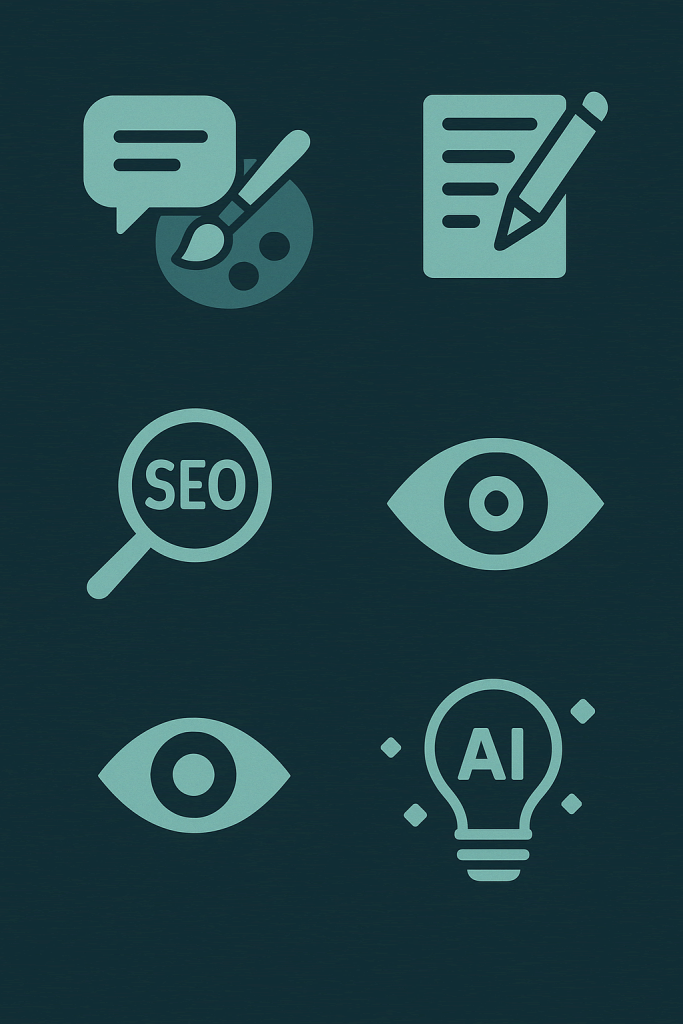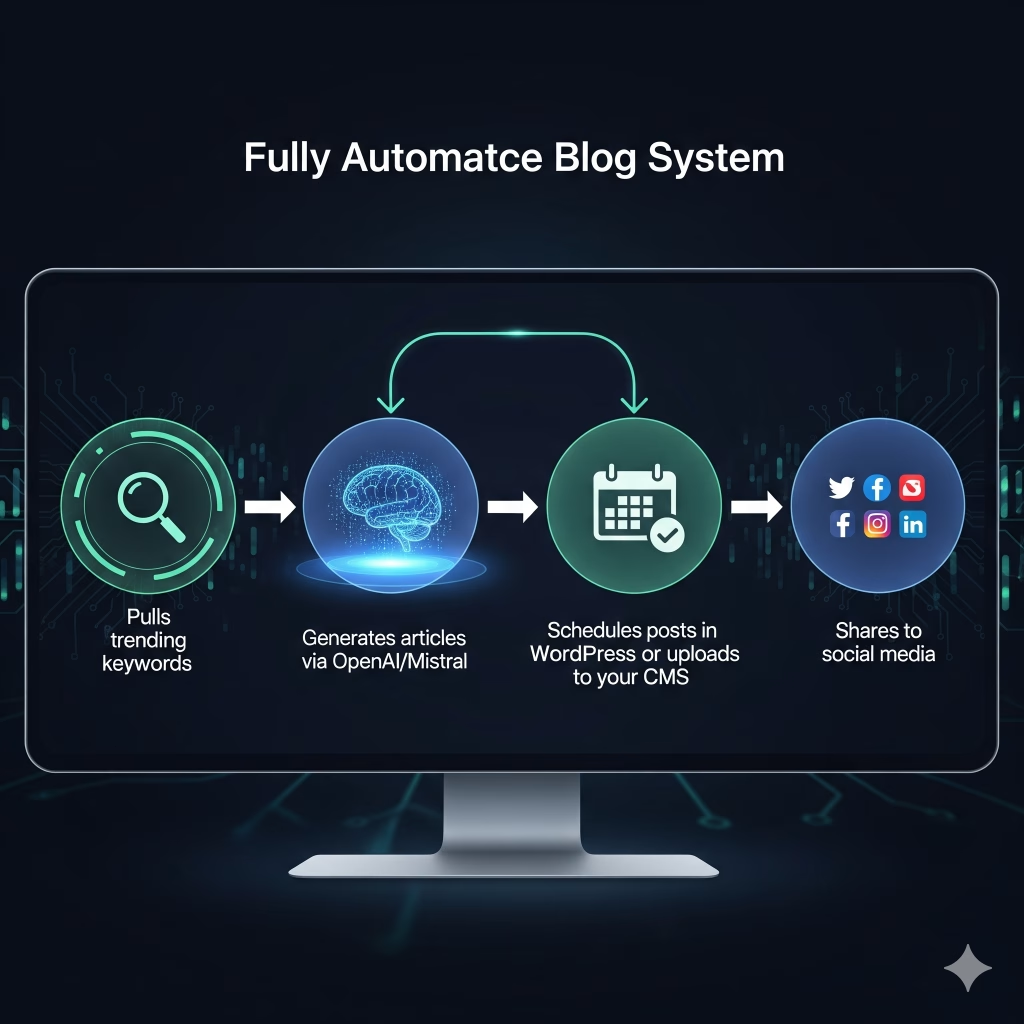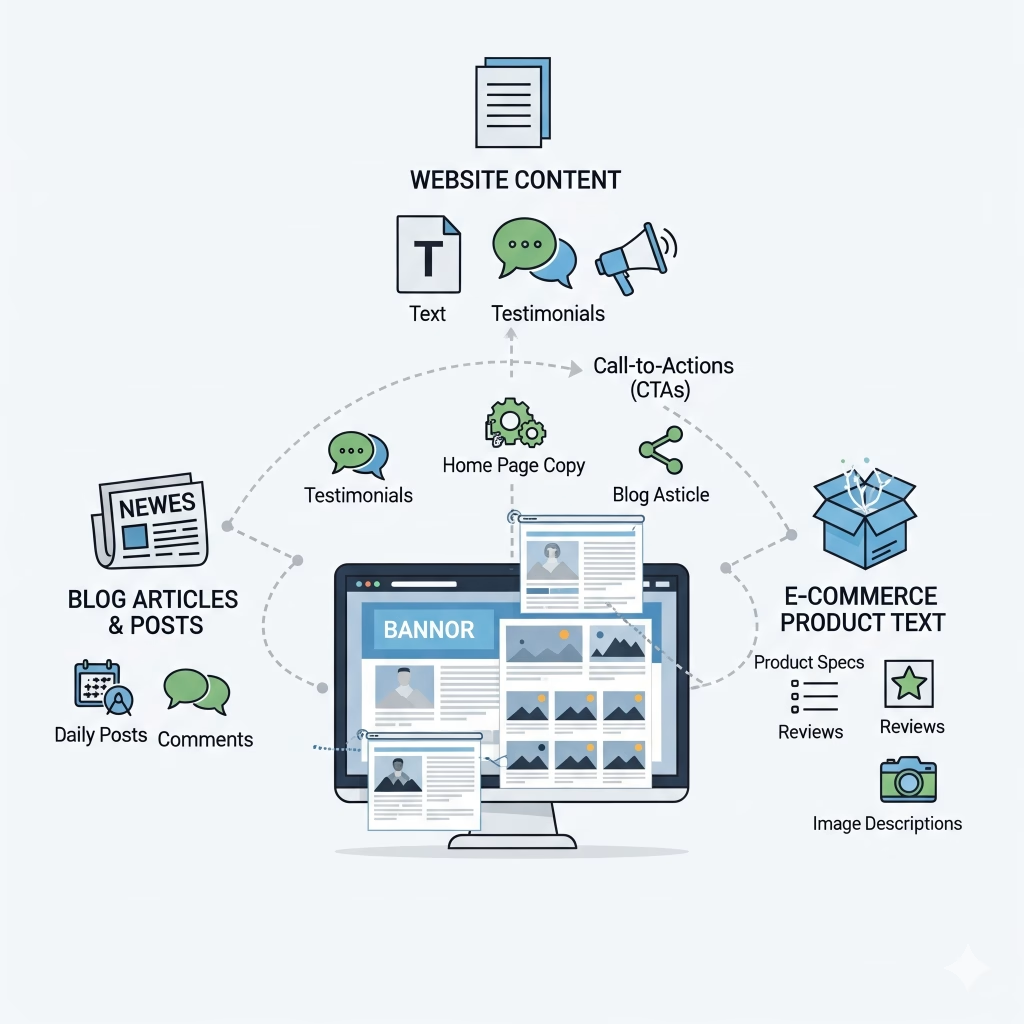Absolutely, you can use AI to generate content across your entire website, from landing pages and blog posts to product descriptions and headlines. This is one of the most practical and time-saving applications of AI, helping you produce well-structured, relevant, and engaging content faster than ever before. It can assist with drafting original text, refining existing copy, or adapting content for different audiences and platforms.

AI content tools are also highly adaptable, making them useful for a wide range of industries and content types. You can guide the tone, style, and format to match your brand, whether you’re aiming for formal, casual, promotional, or instructional messaging. These tools can also help with SEO optimization by suggesting keywords, improving readability, and structuring content for better search performance.
What Kind of Content Can AI Generate?
📝 Website Content
- Home page copy
- About, Mission, Contact pages
- Service or product descriptions
- Testimonials (synthetic or assisted)
- CTAs, taglines, headers, footers
📰 Blog Articles & Posts
- Daily/weekly posts based on niche keywords
- SEO-optimized content
- Summaries or rewrites of existing articles
- Listicles, tutorials, industry news
🛍 E-Commerce Product Text
- Descriptions (short + long)
- Bullet-point specs
- AI-generated FAQs
- Review summaries
💡 SEO + Metadata
- Page titles & meta descriptions
- Image alt text
- Keyword generation
- Content structure analysis
🔁 Social Media Snippets
- Post captions
- Hashtags
- Ad copy
- Newsletter blurbs
🔧 How to Do It on Your Site
✅ WordPress Options
- AI Engine by Jordy Meow
- Generates text for posts or custom pages
- Includes playground and shortcode support
- Bertha.ai
- Designed for marketers and copywriters
- Templates for CTAs, product blurbs, hero sections
- GPT AI Power
- Write entire blog posts with one click
- SEO tools included
- Fine-tuning options for tone and structure
✅ Custom Site (Non-WordPress)
- Use OpenAI API or local Mistral to generate content
- Automate it with:
- Zapier (e.g., trigger on Google Sheet input → AI writes content → upload to CMS)
- Python/PHP script that writes to
.mdor.htmlfiles

🧠 Bonus: Fully Auto-Pilot Blog
You can set up a system that:
- Pulls trending keywords daily
- Generates articles via OpenAI/Mistral
- Schedules posts in WordPress or uploads to your CMS
- Even shares to social media
MORE LINKS:
AI bots installation
AI automation
ChatGPT integration
AI user support
Best CMS for AI
AI in small business
AI newsletters
Content moderation
SEO optimization
USE AI FOR CONTENT CREATION AND AI CONTENT GENERATION FOR E-COMMERCE
When paired with automation tools, AI becomes even more powerful. You can schedule regular content updates, personalize text for different visitors, and streamline your entire publishing workflow. Whether you’re running a blog, an online store, or a service-based business, AI content generation helps maintain a fresh, professional presence while freeing up your time to focus on strategy, creativity, and growth. With the right setup, AI becomes more than just a writing assistant it becomes an extension of your creative and marketing team.

The discussion about whether you can use artificial intelligence for content generation is no longer a futuristic speculation, it is an everyday business reality in 2026. Companies ranging from startups to global enterprises are increasingly adopting AI-driven content generation tools to accelerate marketing campaigns, maintain consistent publishing schedules, and gain competitive advantages in crowded markets. What was once considered experimental or risky is now part of mainstream business strategies, and those who delay adoption are often the ones who struggle to stay relevant. Artificial intelligence does not only produce basic drafts or filler articles, it powers entire ecosystems where written content, visual elements, SEO optimizations, and distribution schedules are unified into streamlined processes. By implementing AI at the core of your content strategy, you can dramatically reduce production costs, increase publishing frequency, and create a more data-driven creative cycle that would be impossible to maintain with human effort alone. However, success depends on knowing how to leverage AI responsibly, balancing automation with human oversight to ensure quality and originality.
One of the major advantages of AI content generation is its ability to scale without proportionally increasing costs. Traditional content teams are limited by time, salary expenses, and human productivity cycles, while AI systems can generate thousands of words in minutes, tailored to specific SEO targets and keyword structures. Tools such as OpenAI or Jasper provide frameworks for drafting blog posts, social media updates, landing page copy, and even email marketing sequences with extraordinary efficiency. This scaling power is what makes AI a transformative force: instead of publishing one or two articles per week, businesses can release dozens of high-quality pieces designed for multiple audience segments, drastically increasing visibility across search engines and social channels. At the same time, these AI-driven platforms are trained to detect patterns in user engagement, meaning that the more you use them, the more tailored and precise the output becomes. This creates a feedback loop where performance insights feed directly into content production, leading to continuously optimized strategies.

Critics often argue that AI content lacks originality or depth, but this objection usually comes from outdated assumptions or misuse of the tools. The reality is that AI is a collaborative partner rather than a replacement for human creativity. When properly guided, it can analyze large datasets, study competitor strategies, and identify overlooked keyword opportunities that humans would struggle to notice manually. For example, a real estate agency could use AI to generate highly localized blog posts about property trends in specific neighborhoods, each optimized for long-tail keywords. A SaaS company might employ AI to produce technical documentation and customer onboarding guides in multiple languages simultaneously. Even industries like healthcare and finance, which require compliance with strict regulatory frameworks, can benefit from AI-generated content that passes through human editorial review before publication. The point is not to outsource creativity, but to supercharge it with analytical precision and automation.
Beyond efficiency, AI also transforms the economics of digital marketing. Businesses that adopt AI-based content generation tools are able to allocate budgets more effectively, diverting resources away from repetitive copywriting tasks toward higher-value initiatives such as strategic planning, UX optimization, and audience research. In competitive industries, shaving even a few hours off content production can be the difference between ranking on the first page of Google or being buried in obscurity. Search engine optimization has always been about producing consistent, relevant, and keyword-aligned content, and AI is uniquely equipped to meet this demand at scale. Modern AI systems integrate directly with SEO analytics platforms like Ahrefs and SEMrush, ensuring that every paragraph produced is aligned with search intent, keyword competitiveness, and backlink opportunities. This integration creates a pipeline where strategy and execution merge seamlessly, turning content creation into an automated growth engine.
There is also a strategic branding angle that should not be overlooked. In an era where consumers are bombarded with information across every digital channel, consistency is one of the most powerful signals of trust and authority. AI tools can maintain brand voice across thousands of touchpoints, ensuring that your blog, newsletters, social posts, and product descriptions all reflect the same tone and identity. For example, AI can be trained on your existing content archives to replicate your company’s unique style, adapting to different contexts while still sounding recognizably “you.” This continuity fosters brand recognition and loyalty, making it easier for customers to trust your expertise and engage with your offerings. When executed properly, AI-driven branding becomes a silent multiplier of customer confidence, which directly translates into higher conversion rates and repeat business.
Of course, adopting AI for content generation requires careful consideration of ethics and best practices. Simply flooding the internet with mass-produced articles without editorial oversight risks creating low-value noise that search engines penalize. Successful businesses approach AI with clear guidelines: fact-checking all AI outputs, aligning with compliance requirements in sensitive industries, and adding human insights that elevate content beyond raw data. Moreover, AI should be seen as a supplement to human expertise, not a replacement. A skilled content strategist working in collaboration with AI can achieve results that neither side could accomplish alone, creating content that is both data-rich and emotionally resonant. By positioning AI as a tool in the hands of experts, companies can avoid the pitfalls of generic output and instead deliver real value to their audiences.
In conclusion, yes, you can absolutely use AI for content generation, but the degree of success depends on how intelligently you integrate it into your workflows. Businesses that treat AI as a tactical shortcut will generate short-lived results, while those that build long-term systems combining automation with human creativity will dominate the digital landscape. The key lies in balancing efficiency with authenticity, scale with quality, and automation with oversight. In 2026, the companies that thrive are not the ones asking if they should use AI for content generation, but those asking how they can maximize it as a central pillar of their growth strategy. By acting now, you position yourself ahead of competitors still hesitating on the sidelines. This is not just a technological shift, it is an economic one, and those who embrace it early will set the standards others will follow.


